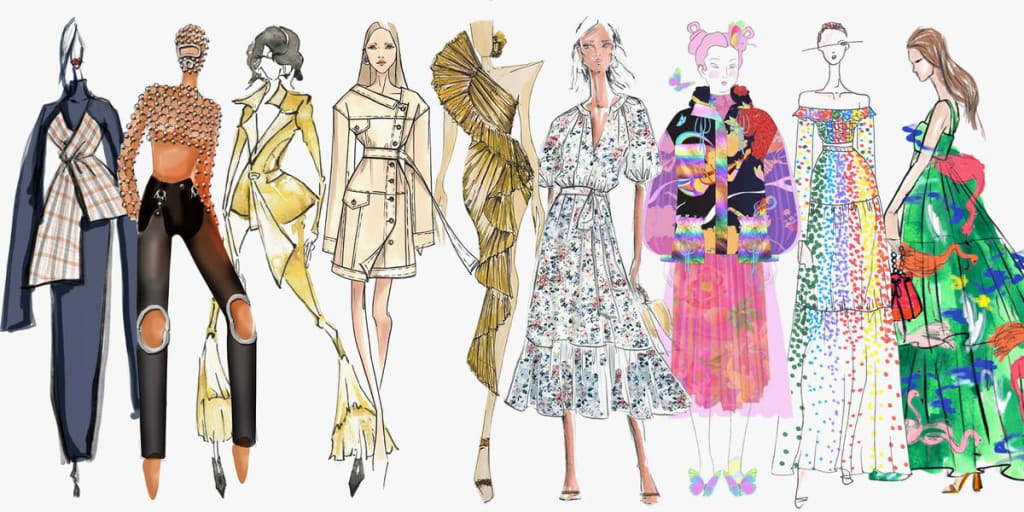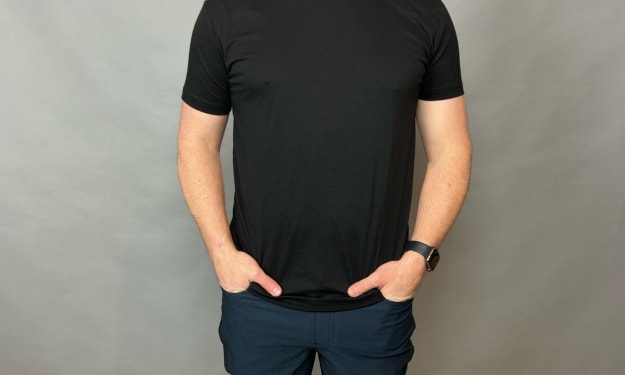The Ultimate Guide to Sustainable Fashion
Dressing Stylishly and Ethically

In a world increasingly concerned about the environmental impact of the fashion industry, sustainable fashion has emerged as a powerful movement. Dressing stylishly and ethically is no longer a contradiction. This comprehensive guide aims to educate and inspire fashion-conscious individuals like you to make sustainable choices without compromising on style. From understanding the importance of sustainable fashion to practical tips for building a sustainable wardrobe, let's explore how you can embrace sustainable fashion and make a positive impact on the planet.
1. The Importance of Sustainable Fashion:
The fast fashion industry has revolutionized our clothing consumption, but its detrimental effects on the environment and society cannot be ignored. Understanding the environmental and social consequences of fast fashion is crucial in advocating for sustainable fashion and creating a more sustainable future.
Fast fashion's environmental impact stems from excessive resource consumption, including water, energy, and raw materials. The industry's reliance on toxic chemicals in textile production contributes to pollution, while its disposable mindset generates an alarming amount of textile waste. Moreover, the transportation and energy-intensive processes involved in fast fashion production contribute to a significant carbon footprint.
Socially, the fast fashion supply chain is marred by the exploitation of workers. Garment factories in developing countries often have poor working conditions, low wages, and labor rights violations. Human rights issues like child labor and forced labor are prevalent within the industry, and the mass production of fast fashion often leads to the displacement of traditional artisans and the erosion of cultural practices and economic challenges.
To address these issues, sustainable fashion initiatives and solutions are crucial. Using eco-friendly materials such as organic cotton, recycled polyester, hemp, and bamboo can significantly reduce the environmental impact. Embracing a circular economy approach, where clothing is designed for longevity, repearability, and recyclability, minimizes waste and maximizes resource efficiency. Responsible production practices, including fair trade, ethical manufacturing, and transparency in the fashion supply chain, are essential to ensure workers' rights and environmental sustainability.
Socially, promoting ethical certifications and standards that guarantee fair wages, safe working conditions, and social compliance in fashion production is paramount. Empowering garment workers through organizations and initiatives that advocate for their rights and well-being helps improve their working conditions and livelihoods. Consumer awareness and activism play a pivotal role in driving change by supporting ethical brands, demanding transparency, and holding fashion companies accountable for their practices.
By comprehending the environmental and social impact of the fast fashion industry, we can make informed choices as consumers. Embracing sustainable fashion empowers us to protect the planet, support fair labor practices, and foster an equitable and conscious fashion industry. Together, let's shift the paradigm and create a future where fashion is not only stylish but also responsible and ethical.
Sustainable fashion is of paramount significance in reducing waste, carbon footprint, and the exploitation of workers. By embracing sustainable practices, such as using eco-friendly materials, promoting circular economy principles, and ensuring fair labor practices, the fashion industry can minimize textile waste, lower carbon emissions, and eradicate labor exploitation. Sustainable fashion empowers consumers to make conscious choices, supports the well-being of workers, and contributes to a healthier planet, creating a more ethical and environmentally friendly fashion ecosystem.
Choosing sustainable fashion offers numerous benefits for both individuals and the planet. It allows individuals to express their personal style while supporting ethical practices, promoting fair labor conditions, and reducing their environmental impact. Sustainable fashion encourages conscious consumption, leading to a more thoughtful and curated wardrobe. By opting for sustainable fashion, individuals contribute to preserving natural resources, mitigating climate change, and creating a healthier planet for future generations. It's a win-win situation that promotes individual well-being and fosters a more sustainable and responsible fashion industry.
2. Understanding Sustainable Fashion:
Key concepts and principles of sustainable fashion encompass eco-friendly materials, fair trade practices, and ethical manufacturing. Eco-friendly materials include organic cotton, recycled polyester, and innovative alternatives like hemp and bamboo, minimizing environmental impact. Fair trade practices ensure fair wages, safe working conditions, and social compliance in the fashion supply chain. Ethical manufacturing prioritizes transparency and accountability, promoting worker rights and environmental sustainability. These principles aim to create a fashion industry that respects both people and the planet, fostering a more sustainable and responsible approach to clothing production and consumption.
Sustainable fashion refers to the overall approach of minimizing the environmental impact of the fashion industry while considering social and economic factors. It focuses on using eco-friendly materials, reducing waste, and adopting responsible production practices. Slow fashion advocates for consuming and producing clothing at a slower pace, emphasizing quality, longevity, and timeless style. It aims to counter fast fashion's disposable nature. Ethical fashion emphasizes fair treatment of workers, supporting safe working conditions, fair wages, and human rights. It promotes transparency and accountability throughout the supply chain, ensuring ethical manufacturing practices.
Patagonia: Known for its commitment to sustainability, Patagonia focuses on using recycled materials, reducing waste, and promoting fair labor practices. They offer a Worn Wear program, encouraging customers to repair and reuse their clothing.
Stella McCartney: Stella McCartney is a pioneer in sustainable luxury fashion. They prioritize using vegan materials, avoiding fur and leather, and implementing innovative, eco-friendly processes. Their dedication to sustainable practices has earned them recognition and numerous awards.
Everlane: Everlane is known for its radical transparency, providing customers with detailed information about their supply chain and production costs. They prioritize ethical manufacturing, fair wages, and high-quality materials, creating timeless wardrobe essentials.
Reformation: Reformation combines fashion-forward designs with sustainable practices. They use eco-friendly fabrics and implement responsible manufacturing processes. Additionally, they focus on reducing their carbon footprint and water usage throughout their supply chain.
Eileen Fisher: Eileen Fisher promotes sustainable and ethical practices by using organic and recycled materials. They prioritize fair labor practices and have a take-back program to recycle and upcycle garments.
These brands showcase innovative approaches to sustainable fashion, emphasizing transparency, eco-friendly materials, ethical manufacturing, and responsible business practices. By supporting these brands, consumers can contribute to a more sustainable and ethical fashion industry.
3. Building a Sustainable Wardrobe:
To assess your current wardrobe and identify areas for improvement in terms of sustainability, consider the following steps. Firstly, take inventory of your clothing, considering the materials, quality, and frequency of use for each item. Identify pieces that are versatile and timeless, as they have a lower environmental impact. Next, evaluate your shopping habits and determine if there is a need to reduce impulsive purchases or fast fashion items. Look for opportunities to repair or upcycle clothing instead of discarding them. Lastly, educate yourself about sustainable fashion brands and their practices, and make more conscious choices when adding new pieces to your wardrobe, opting for ethical and eco-friendly options..
To declutter and organize your closet in a sustainable manner, follow these practical tips. Start by removing all items and sorting them into categories: keep, donate, sell, or recycle. Assess each item's quality, fit, and versatility to make informed decisions. Prioritize keeping timeless and high-quality pieces that align with your personal style. Donate or sell items in good condition that no longer serve you. Recycle or repurpose worn-out garments to minimize waste. Optimize your closet space with efficient storage solutions like bins, hangers, and shelves. Finally, create a capsule wardrobe with versatile pieces that can be mixed and matched, allowing for more sustainable and mindful outfit choices.
Creating a capsule wardrobe based on versatile and timeless pieces is a sustainable approach to fashion. Start by assessing your personal style and lifestyle needs. Choose neutral colors as the foundation and add pops of color with accessories. Invest in high-quality essentials like a tailored blazer, classic white shirt, versatile trousers, little black dress, and well-fitting jeans. Opt for quality fabrics that are durable and easy to maintain. Aim for pieces that can be easily mixed and matched to create various outfits. Keep your capsule wardrobe compact, with around 30-40 items, to ensure you wear and appreciate each piece. By curating a capsule wardrobe, you'll simplify your choices, reduce waste, and create a sustainable and stylish collection of clothing.
4. Ethical Shopping:
To declutter and organize your closet in a sustainable manner, follow these practical tips. Start by removing all items and sorting them into categories: keep, donate, sell, or recycle. Assess each item's quality, fit, and versatility to make informed decisions. Prioritize keeping timeless and high-quality pieces that align with your personal style. Donate or sell items in good condition that no longer serve you. Recycle or repurpose worn-out garments to minimize waste. Optimize your closet space with efficient storage solutions like bins, hangers, and shelves. Finally, create a capsule wardrobe with versatile pieces that can be mixed and matched, allowing for more sustainable and mindful outfit choices.
When shopping ethically, it's important to look for certifications and labels that ensure transparent and responsible practices. Keep an eye out for certifications like Fair Trade, which guarantees fair wages and safe working conditions for workers. Look for organic certifications such as GOTS (Global Organic Textile Standard) and Oeko-Tex Standard 100, indicating that the fabrics are produced without harmful chemicals. Additionally, certifications like B Corp and Certified B Corporation demonstrate a brand's commitment to social and environmental performance. These certifications and labels serve as valuable indicators of a brand's ethical and sustainable practices, helping consumers make informed choices and support responsible fashion.
Embracing sustainable alternatives to traditional shopping can have a significant positive impact. Consider exploring second-hand shopping, where pre-loved clothing finds new life, reducing waste and promoting circularity. Upcycling is another creative approach, transforming old garments into new and unique pieces. Clothing rental services allow you to enjoy the latest trends without the need for permanent ownership. These sustainable options not only reduce environmental impact but also offer opportunities for budget-friendly and fashion-forward choices. By embracing second-hand shopping, upcycling, and clothing rental, you can contribute to a more sustainable fashion industry while expanding your wardrobe in a conscious and responsible way.
5. Embracing Conscious Consumption:
It's time to reflect on our shopping habits and embrace mindful consumption. By pausing and considering the true value of our purchases, we can break free from the cycle of fast fashion and make more intentional choices. Ask yourself if you truly need an item, how it aligns with your values, and whether it will stand the test of time. Focus on quality over quantity and invest in pieces that bring joy and have a positive impact. By shifting our mindset towards mindful consumption, we can foster a more sustainable and fulfilling relationship with fashion, benefiting both ourselves and the planet.
To extend the lifespan of your clothing and reduce waste, proper care and maintenance are essential. Follow these tips:
Read the care labels and follow the instructions for washing, drying, and ironing.
Wash clothes less frequently to preserve their quality and color.
Use eco-friendly detergents and cold water whenever possible.
Air-dry your clothes instead of using the dryer.
Repair minor damages like loose buttons or small tears promptly.
Store clothes in a cool, dry place to prevent mold and discoloration.
Rotate your wardrobe to evenly distribute wear and tear.
Consider professional alterations to update or modify items.
By taking care of your clothes, you'll not only prolong their lifespan but also reduce the need for constant replacements, contributing to a more sustainable and mindful approach to fashion.
Investing in quality pieces is a key aspect of sustainable fashion. By choosing well-made garments that are designed to withstand wear and trends, you can build a timeless wardrobe that lasts for years. Quality pieces often use durable materials, precise craftsmanship, and thoughtful design. While they may require a higher upfront investment, their longevity and versatility make them a sustainable choice in the long run. Look for classic styles, neutral colors, and timeless silhouettes that can be easily mixed and matched. By focusing on quality rather than quantity, you can reduce waste, support ethical practices, and create a wardrobe that transcends fleeting fashion trends.
6. Styling Sustainable Fashion:
Get ready to elevate your style with these creative and stylish outfit ideas using sustainable pieces. Mix and match a vintage denim jacket with a flowy organic cotton maxi dress for a boho-chic look. Pair a sleek bamboo blouse with high-waisted ethically made jeans for a sophisticated yet casual ensemble. Layer a cozy alpaca wool sweater over a vegan leather skirt for a trendy and sustainable twist. Accessorize with handmade jewelry crafted from recycled materials to add a unique touch to your outfits. With sustainable fashion, you can showcase your personal style while making a positive impact on the planet. Embrace eco-conscious choices and let your fashion choices inspire others to join the sustainable fashion movement.
Elevate your fashion game with these tips for mixing and matching, accessorizing, and creating versatile looks. Experiment with layering different textures and patterns to add depth and interest to your outfits. Invest in timeless accessories like a statement belt or a classic handbag that can effortlessly elevate any ensemble. Opt for versatile pieces that can be dressed up or down, allowing you to create multiple outfits with minimal items. Don't be afraid to play with colors and experiment with unexpected combinations. By embracing your creativity and maximizing the potential of your wardrobe, you'll unlock endless possibilities for stylish and sustainable looks.
From casual to formal, sustainable fashion offers a plethora of options for every style and occasion. Explore laid-back bohemian vibes with flowy organic cotton dresses and ethically made accessories. Embrace sleek sophistication with tailored pieces crafted from eco-friendly fabrics. For active lifestyles, discover sustainable activewear that combines comfort and style. Attend special events in elegant evening gowns made from recycled materials. Whether you're heading to the office, a music festival, or a wedding, sustainable fashion has you covered with its diverse range of styles, proving that you don't have to compromise your values for impeccable style.
7. Spreading the Message:
Your sustainable fashion journey is unique and powerful. Share your experiences, tips, and favorite eco-friendly finds to inspire others on their path to conscious choices. Whether it's through social media, blogging, or joining online communities, your voice can make a difference. Spark conversations, offer support, and celebrate the progress we collectively make towards a more sustainable fashion industry. Together, we can create a movement that transforms the way we think about fashion and empowers others to embrace sustainability. Share your story and inspire others to join this transformative journey.
Social media has revolutionized the way we connect and share ideas, making it a powerful platform for promoting sustainable fashion. Through social media, individuals and brands can raise awareness, educate, and inspire others to make conscious fashion choices. Communities of like-minded individuals form, fostering dialogue, support, and the exchange of sustainable fashion tips. Influencers, bloggers, and activists amplify the message, reaching wider audiences and sparking conversations on sustainability. Social media enables the sharing of sustainable fashion brands, initiatives, and resources, creating a collective movement towards a more ethical and eco-conscious industry. Together, we can harness the power of social media to drive positive change and build a community that champions sustainability in fashion.
Education and awareness play a vital role in driving industry-wide change towards sustainable fashion. By educating ourselves and others about the environmental and social impacts of the fashion industry, we can make informed choices and demand transparency from brands. Awareness campaigns raise consciousness about the need for sustainable practices, ethical production, and responsible consumption. Knowledge empowers consumers to support sustainable brands, hold the fashion industry accountable, and advocate for systemic change. Through education and awareness, we can create a collective force that challenges the status quo, pushes for sustainable alternatives, and fosters a more conscious and responsible fashion industry.
Conclusion:
By following this ultimate guide to sustainable fashion, you have the opportunity to make a positive impact on the environment and contribute to a more ethical fashion industry. Remember, dressing stylishly and ethically is not only possible but also empowering. Embrace sustainable fashion as a means to express your personal style while creating a more sustainable and conscious future. Together, let's revolutionize the fashion industry one stylish and ethical choice at a time.






Comments
There are no comments for this story
Be the first to respond and start the conversation.